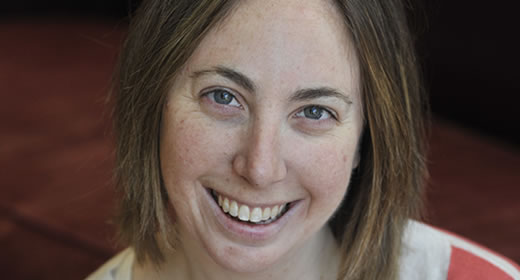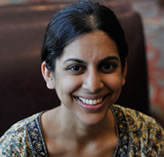
As we celebrate 50 years of international Peace Corps service, the Ford School reflects on the impact of the Fellows/USA program—a fellowship for returned Peace Corps volunteers who agree to complete policy-related internships in underserved U.S. communities.
When Alexis Guild finished her Peace Corps placement in Guatemala last year, where she served as a health facilitator for five rural primary schools, she was determined to continue her work in international development. "It was because of the Peace Corps that I chose to pursue a master's in public policy," says Guild, adding that U-M's historic connection to the founding of the Peace Corps played a big part in her decision to pursue that degree at the Ford School.
Skip this paragraph if you already know the story, but for the rest of you, that historic connection goes something like this. Fifty years ago, presidential hopeful John F. Kennedy visited the University of Michigan while on the campaign trail. Thousands of students crowded around the Michigan Union steps, waiting for him to arrive. When he did, his speech writers and campaign advisors went straight to bed (it was 2 a.m., after all), but Kennedy spoke to the crowd briefly, giving a speech that no one anticipated. In it, he shared some ideas he'd been mulling over about "a higher purpose" for universities and students, asking students if they would consider serving abroad—in nations like Ghana—in the interest of peace. Michigan students picked up the charge, circulating a petition that thousands signed, each pledging to serve. Energized by their enthusiasm, Kennedy began to pitch the idea from the campaign trail, and founded the Peace Corps by executive order after winning the presidency by a narrow margin—a margin some attribute to the fervor he generated with that speech.
Of course, Guild's choice to attend the Ford School might also have been motivated by the fact that the school participates in the Peace Corps' Fellows/USA program, offering generous financial assistance to returned volunteers who agree to intern in underserved communities in the states. International volunteer experiences, inspiring and informing domestic volunteer experiences—that's the hallmark of this program. Since it was launched, more than 3,000 returned Peace Corps volunteers—including 31 from the Ford School—have completed meaningful internships in underserved American communities.
For returned volunteers, the Fellows/USA program offers generous educational benefits: their application fees are waived, and, if accepted, they receive a $10,000 tuition fellowship for each of the program's two years. For the Ford School, says Associate Director of Student and Academic Services Beth Soboleski, the program is a great way to connect with students who have a demonstrated commitment to international service, who bring back interesting and relevant experiences to enrich discussions in the classroom, and who can have a deep impact on pressing domestic policy concerns in health, criminal justice, environmental regulation, economic development, and other policy arenas.
 |
|
Mahima Mahadevan |
Mahima Mahadevan, currently pursuing her MPP at the Ford School, spent her Peace Corps placement teaching English to 8th through 11th grade students in a tiny village in the Kyrgyz Republic. Unfortunately, the only time most of her students ever heard English spoken was during the two hours per week they spent in her course—something that made progress slow. To overcome that challenge, Mahadevan supplemented her traditional class sessions with after-school clubs focused on sports, arts and crafts, and cooking. Then she purchased a TV and DVD player for the school to show movies in English. Students had to complete their homework for the week to get a pass for movie club. Once there, Mahadevan would show a portion of the film in English, then watch it again with Russian subtitles. "The kids loved it."
When she returned to the U.S. in 2006, she spent two-and-a-half years in Detroit, applying her teaching skills there. Then she came to the Ford School, tapping into the Fellows/USA funding, to broaden her impact by learning more about domestic education policy. For her Fellows/USA internship, Mahadevan spent ten weeks at the Imagine Fund in Lansing, Mich., researching the impacts of Michigan's recent affirmative action ban to find out how this law is affecting Black and Hispanic student enrollment and educational outcomes.
Today, Mahadevan wants to apply her international and domestic skills and experiences to urban and education policy. "Being named a Peace Corps Fellow has been critical in my transition from international service to a career in education advocacy," she says. At the Ford School, we just say "Thank you, Peace Corps, and happy birthday!"
Below is a formatted version of this article from State & Hill, the magazine of the Ford School. View the entire Fall 2010 State & Hill here.
Photos courtesy of David Giltrow, Fred Shippey, and Sam Wolson/Daily.